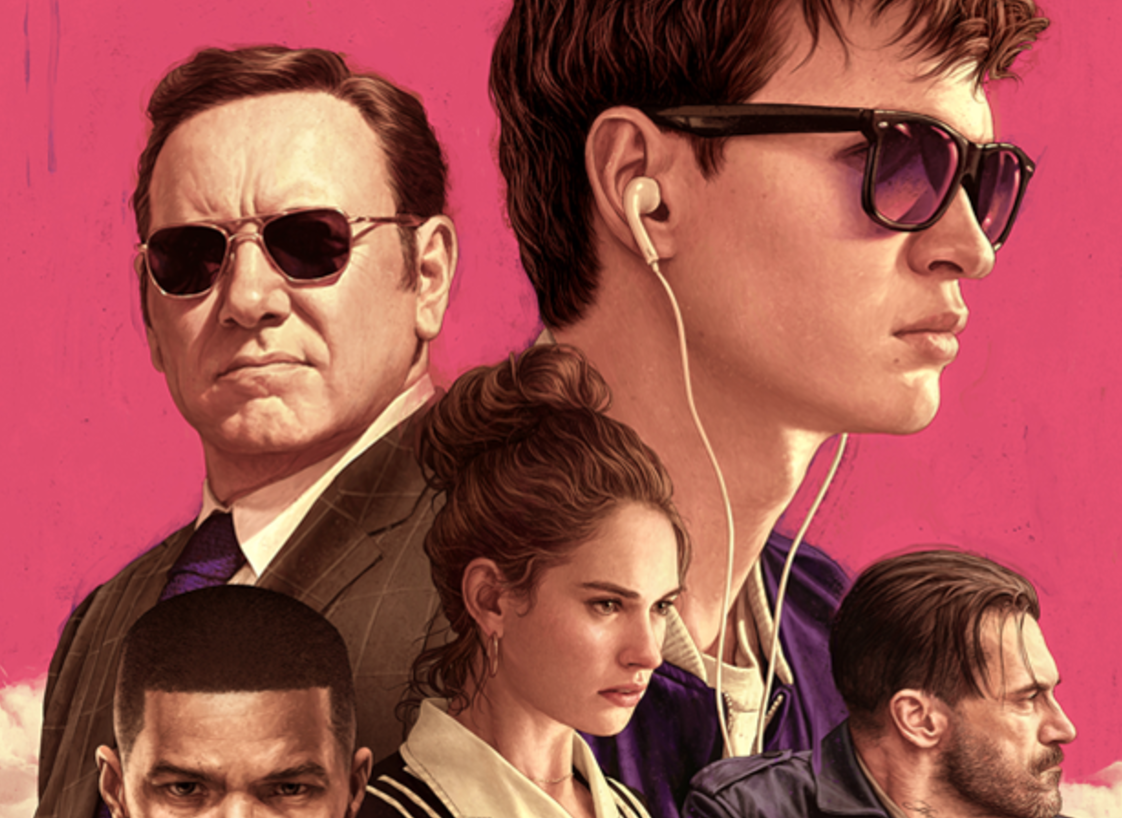What’s a kid with tinnitus and a love of music to do but turn to the constant infiltration of songs swelling through his earbuds to quiet the mind and the noise? Well, the additional answer is: drive. Drive like the wind–except more choreographed. Like all getaway drivers, Baby’s (Ansel Elgort) got a tortured past–you know, like “Driver” (Ryan Gosling) in Drive. In fact, among many other films’ pastiche mined by Wright, both epic Gosling features Drive and The Place Beyond the Pines come to mind when viewing Baby Driver. Though Wright hasn’t written anything particularly innovative (there are no shortage of films about bank heists centered around fatal romance) with this, his most critically acclaimed screenplay, it is his approach to the genre that makes the work stand apart from others “like it.”
First and foremost, of course, is Wright’s use of music throughout. There isn’t a single scene that isn’t somehow focused on Baby’s obsession and need for the perfect song to punctuate and syncopate each moment. And at the core of this soundtrack is Wright’s distinct Britishness. This is a man who experienced the height of Britpop in the 90s, hence the use of staples like Blur (albeit a more obscure cut, “Intermission”). Wright also capitalizes on the indie stylings of the U.S. in the 90s, making “Bellbottoms” by The Jon Spencer Blues Explosion sound all fresh and new again (Spencer himself makes a cameo as a prison guard, to boot).
As is according to the filmic gospel, every protagonist driven by the need to get involved with robbery tends to have some sort of familial issue to avenge (just look at something as recent as Hell or High Water). Baby is no different, the loss of his parents in a car accident as they were arguing being the catalyst that fuels his own need to drive as a release and escape. Some people try to avoid the source of their trauma, Baby prefers to immerse himself in it. But like any man that thinks he’s an island, the woman of his dreams has a tendency to come along and ruin the untouchability of isolation. Baby’s only connection to anyone thus far is his aging and deaf foster father, Joseph (CJ Jones). Other than that, however, Baby is a lone wolf–the ideal criterion for a life of crime. Meeting Debora (Lily James–look out, Emma Watson) at his favorite diner, Bo’s, changes all of that. He’s seen her before, walking the streets wearing headphones, too. Their shared love of music and the open road is what instantaneously forges their bond. And somehow, the puppy love dialogue between them doesn’t come across as overly cheesy–instead an authentic re-creation of how two people would actually discuss Beck’s “Debra” versus T. Rex’s “Debora.”
It helps Debora’s Oedipal cause that she looks a lot like Baby’s mom (Sky Ferreira) and, like her, also has aspirations to sing. From the moment he hears her crooning “B-A-B-Y” from the song by Carla Thomas, it’s over for Baby, he’s a man in love. And with this emotional attachment comes the high risk of having someone that can be taken away from him. His employer, the nefarious Doc (Kevin Spacey), finds out this information all too quickly–knowing just how to get him back into the life he tried to leave after repaying his debt to Doc for stealing one of his cars.
And what is high risk rendered to film without a touch of high-powered music?–like Queen’s “Brighton Rock,” a song that Baby and his fellow crew member, Buddy (Jon Hamm), relish together–much to the dismay of Bats (Jamie Foxx), just one of many criminals who work with Baby that tend to become vexed by his music listening and nonplussed, non-committal aura. The only one who isn’t irritated by it is Doc, who gives him a surprising amount of license (no pun intended) in return for Baby’s continued success with every job.
As the stakes rise and Baby becomes more invested in his relationship with Debora, Doc at one point unexpectedly comments, “I was in love once,” suddenly a prisoner to his softer, empathetic side. And yes, isn’t love always the motivator in any truly great film–any instant classic, if you will? No matter how significantly society evolves (to the point where fucking robots is real), romance as the galvanizing force behind every meaningful action will continue to be what makes a piece of cinema epic. And Baby Driver is just that, car chases, murders, postcards sent to prison and all.
Accordingly, Edgar Wright has officially been embraced by Hollywood and the American moviegoing public with Baby Driver, though his reign as a god of British TV and film has been secured ever since 1996 with Asylum, which spurred the continued collaboration between Wright and Simon Pegg for Spaced, helping both parties further establish their particular comedic brand with the Three Flavours Cornetto trilogy of Shaun of the Dead, Hot Fuzz and The World’s End. Wright’s absorption of U.S. pop culture (the titles to Baby Driver turn into a sendup of Taxi Driver for fuck’s sake) bleeds beautifully into his understanding of true Americana–his decision to set the story in Atlanta being the most glaring example of this. And Baby’s constant daydreamy sequences back to the 50s–when automobile lust and its signification of freedom was at its prime–only further add to this heightened connection Wright has to U.S. audiences. This affinity existing even in spite of some critics being particularly harsh toward what appeals to said audience in the current moment, insisting that Baby Driver “caters to the blinkered, solipsistic state of our present-day culture; it’s an Asperger’s masterpiece.” Well, then, call me a retard for thinking Wright has actually managed to achieve an unthinkable feat in modern cinema: reinventing the wheel (again, no pun intended).





















